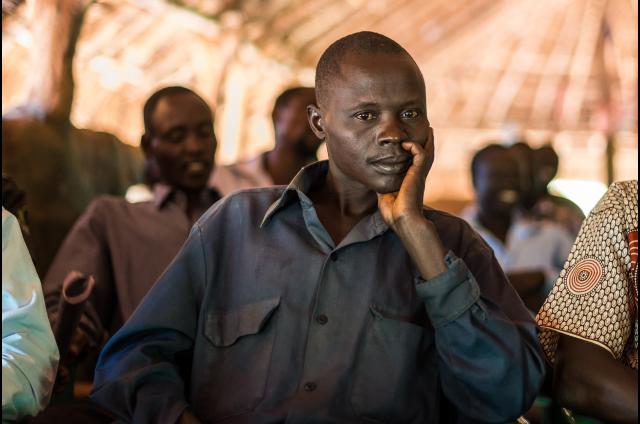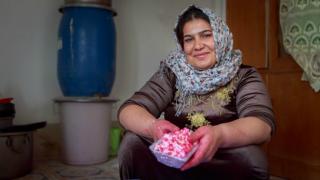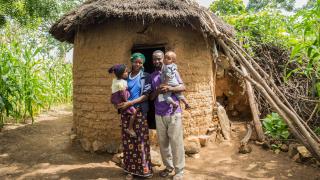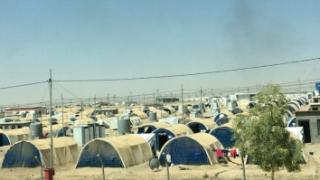Engaging Men
Local leaders challenge the patriarchy
For more than 10 years, Women for Women International's team in Afghanistan has worked to engage male leaders in Nangarhar province through our Men’s Engagement Programme. The province is among the most conservative and patriarchal regions where we work. Just a 40-minute drive from Pakistan, the influence of the Taliban is still felt in Nangarhar. Driving through the markets and streets to our training centre, there are very few women in these public spaces, a stark contrast to Kabul. Just weeks after this interview, the Taliban closed several schools in the province, forcing 20,000 children to miss classes. As opportunities for education and social services have been diminished by decades of war, people turn to local leaders for advice and counsel on legal, religious, and social matters.
Ghulam Rabi, a local leader in Nangarhar, feels a deep responsibility to the 670 families in his community. At 52, Ghulam was one of 50 men in his community who participated in our men's training programme in 2014. For several months, they met for two days each week to discuss women’s rights, using the verses or "Surahs" of the Qur’an as a guide.
Women's Rights in Islam
The power of interpretation
“We didn’t know about these verses, and all the rights that women have in the Holy Book,” says Ghulam. When he was younger, Ghulam had the chance to go to school, where he learned to recite the Qur’an in Arabic. Yet neither he, nor the other leaders in the community, ever studied the Qur’an from the perspective of women’s rights. His education was cut short when the Russians invaded Afghanistan, and he was forced to leave school. Before attending the programme on men’s engagement, Ghulam says he and other community leaders consulted with religious scholars when they had a question on how they should advise their community members.
The scholars, however, only knew the Arabic transcript of the Qur’an. They didn’t know the different ways to interpret the text, and how knowing the translations and definitions offers guidance that affirms women’s rights. “I believe that Islam is an open, bright religion, and has good rights for women,” says Ghulam, reflecting on the lessons he and the other community leaders learned in the men’s training programme. With this knowledge, he feels better informed to advise his community.
Confronting Community Challenges
A NEW PERSPECTIVE
Ghulam’s face lights up as he shares how in the few months since starting the programme, he has been taking what he learned to help his community. “One thing we struggled with as a community, when we married or engaged our daughters, is that we would not ask them,” he says. In Ghulam's community, there was a cultural practice of engaging a baby girl at birth to the boy she would marry when she was older. “We didn’t know any different, and we thought this was part of our religion.”
During the programme, the men studied how the Qur’an supports the right of women to choose their own husbands, and how women should not be married as young girls. “Our trainers explained to us that marriage is not a matter of one or two days – but a matter of life. So if you are going to give your daughter to someone she doesn’t know, she is going to spend all of her life with him. It is better to ask women about their choice and their decision about these things.”
After this programme, we have now realised that our cultural practices are against Islam.
EMBRACING CHANGE
Ghulam promotes women's rights and respect
Shortly after Ghulam finished the men's programme, a local man came to him to ask for advice. He was poor, and struggling to support his family, so he wanted to sell his daughter in marriage. The money would enable him to provide for his remaining family members, but would change his daughter's life forever. Before the training, Ghulam says he would have agreed with the man. But this time, he said, "No, you should not sell your daughter for money. And he listened to me.” Ghulam is also defending women's and girls' right to education, going against conservative religious scholars who advocate against it. Violence against women was also a common problem in his community.
Before the programme, many men thought beating their wives and keeping them at home was in line with the teachings of Islam. “Which was totally the opposite,” says Ghulam. In his own family, Ghulam says he used to fight with his wife about her cooking, or why she showed her face to others. “But now, we don’t treat [our wives] like we treated them before...even my wife asked me, ‘Why have you suddenly changed?’” says Ghulam, with a smile. “I say it was because of the village’s scholars and the programme that we participated in.”
If men need education, women need education. If we need to know the rights of women, they should also know about their rights.
Continue reading
Keeping the Window Open
subtitle:
The harsh conditions of conflict and displacement in the KRI have forced families and communities to allow women to engage in economic activities. This necessity can be a window of opportunity.
Women for Women International and 20-first are tackling gender inequality and discrimination from countries affected by conflict to boardrooms and homes across the West, making equality everyone's business.
Katie shares her experience in Erbil, Kurdistan Region of Iraq.




